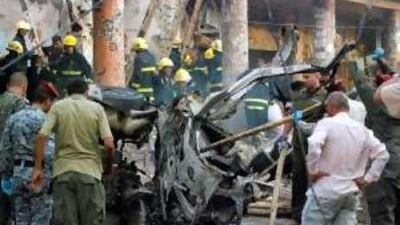KUT // The twin blasts that tore through central Kut lastweek did more than kill people and maim many others. They marked a bloody first in Iraq's insurgency.
The co-ordinated attack, which took place Tuesday evening, was the only car bombing the city has ever suffered. There has been violence in Kut since the 2003 invasion, largely clashes between security forces and Shiite militias. However, nothing compares to these explosions. If the bombers aimed to spread panic through what had been considered a safe area, then they succeeded. Kut is the provincial capital of Wasit, long considered one of Iraq's safest regions, and the city was a fortress of sorts that al Qa'eda had never been able to penetrate. Until the blasts, local authorities had largely occupied themselves with trying to attract foreign businessmen and investors.
They would brush away questions over security with a dismissive gesture, explaining that Baghdad was 160km away and that in Kut there was nothing to worry about. Now it is fear that tops the agenda, with officials warning that al Qa'eda, widely accused of carrying out the strike although no one has claimed responsibility, has managed to establish effective cells in this part of Iraq's Shiite south.
There is also concern that the security forces, which had been considered highly effective against the Mahdi Army, were in this case badly exposed, possibility indicating they have been infiltrated by al Qa'eda sympathisers. "Al Qa'eda has a new plan to activate their agents in Wasit and to conduct more attacks in the province," said Mahmoud Tala, the head of the provincial council. "We can say that the security services are also involved because they have been infiltrated by extremist groups."
He described the attack, which killed at least 15 people and wounded 60 others, as "well-planned". There were two bombs, one in a car, the other on the side of the road nearby, in a central market. "No one has broken security in Kut for years but now we see there are al Qa'eda cells operating here," Mr Tala said. "And we believe they are getting some kind of co-operation from inside the army." Since the bombings, people have been quick to pin some of the blame on the long delays in forming an Iraqi government following elections five months ago. There is consensus here that national-level political paralysis has given insurgents a window of opportunity, in which to destabilise what was already a fragile situation.
The root causes are deeper than any immediate political problems, said Mahar al Douri, an MP from Kut with the Sadrist movement. She said persistent failures to address unemployment, poverty and poor public services had made it possible for extremist groups to find supporters. "The reason more people are now with al Qa'eda is because they have been left utterly hopeless," she said. "For seven years politicians have gone around here and made all kinds of promises to the poor, saying they would get them jobs and improve their lives.
"Now they see the parties fighting for power instead of acting on those promises and that has left people, especially the poor, in a despairing situation. Some have no money for food, and so they will take money from al Qa'eda. "People are giving up hope and there is nothing more dangerous." Al Qa'eda is now thought to have active cells in Kut and in Aziziyah, another of the province's major Shiite towns once considered safe, according to security sources in Wasit.
In the northern part of Wasit, there are reports that the situation has deteriorated even further. These rural areas have a mixture of Sunni and Shiite tribes and have been the scene of a number of assassinations in recent months, including car bombs and the murder of tribal leaders who had sided with US and government forces as part of the so-called Awakening movement. These zones were once al Qa'eda strongholds, before the tribes turned against the militants.
Ala Allawi, an independent political analyst from Wasit, said the conditions were becoming more dangerous and that he expected more attacks in the coming months. "Poverty is increasing, people feel betrayed by politicians and among the tribes there are elements that are again co-operating with al Qa'eda." He said extremist groups had played a clever tactical game, biding their time and learning from previous heavy losses at the hands of Iraqi security forces.
"Those in charge of al Qa'eda are smarter than they used to be," he said. "They have set up their cells and waited for the right political moment to attack. These groups used to be very boastful but now they are quiet and effective and may prove more deadly." On the same day as the Kut bombings, al Qa'eda fighters in Baghdad shot dead five police officers and raised a flag for the Islamic State of Iraq, the name under which the group operates here.
The bloodshed in Baghdad is something that those who live outside Iraq's capital have a tendency to shrug off, and in Wasit it is no different. But with the Kut bombings, the chaos of a continued insurgency can no longer be ignored. Abbas al Zardari is a gold seller with a shop close to Amal square, where the explosions occurred. His two sons were minding the store when the bombs detonated. Both were hospitalised.
Mr al Zardari's shop was looted, despite the heavy post-bombing security blanket in the area. His financial losses ran to tens of thousands of dollars, he said. "For the first time in seven years, I feel really afraid," he said. "The security situation is getting worse. When I saw what had happened to my sons and my shop, I lost my last hope that Iraq will ever get better." @Email:nlatif@thenational.ae

